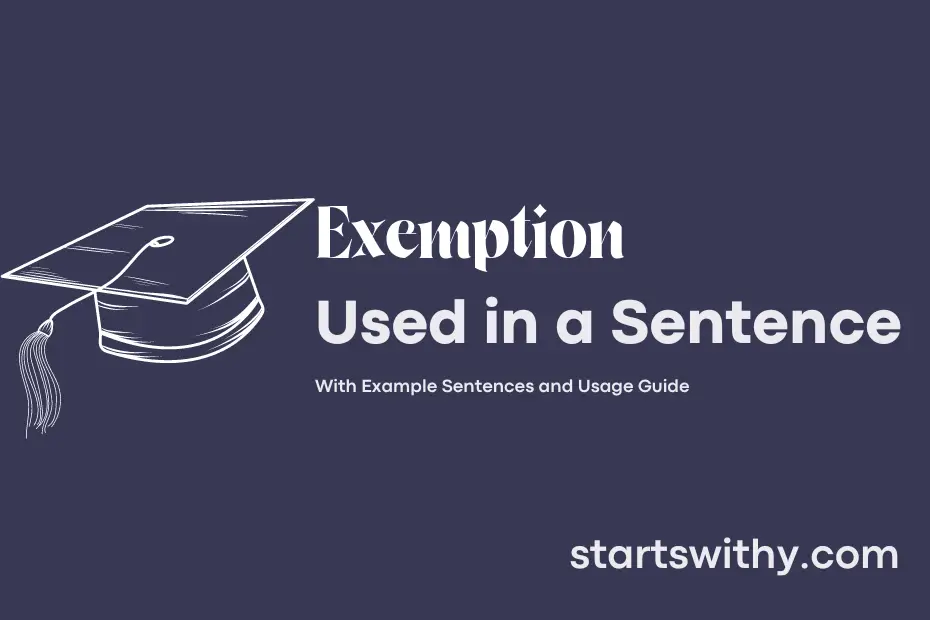Have you ever wondered what an exemption actually means? In simple terms, an exemption refers to being released or freed from a particular duty, obligation, or requirement. This can apply to a wide range of situations, from taxes to rules and regulations.
In legal contexts, exemptions can grant individuals or entities special privileges, immunities, or advantages by excluding them from certain restrictions or obligations. Understanding exemptions is crucial when navigating various laws and regulations, as they can significantly impact one’s rights and responsibilities.
7 Examples Of Exemption Used In a Sentence For Kids
- Exemption means you don’t have to do something everyone else has to do.
- We got an exemption from wearing our school uniforms on Fridays.
- If you have a doctor’s note, you might get an exemption from taking a test.
- Students who have perfect attendance can receive an exemption from the final exam.
- Sometimes, teachers can give students an exemption from doing homework.
- Everyone in our class got an exemption from cleaning up after lunch today.
- If it’s raining outside, we might get an exemption from going to the playground.
14 Sentences with Exemption Examples
- Exemption from attendance was granted to students participating in the college sports meet.
- Students with exceptional grades may be eligible for exemptions from certain courses.
- International students may be able to apply for exemptions from language proficiency tests.
- Students with documented medical conditions can request exemptions from physical education classes.
- Exemption from late fees may be granted for genuine cases of financial hardship.
- Students holding leadership positions in college clubs may receive exemptions from certain responsibilities.
- Exemption from a mandatory workshop can be granted with prior approval from the faculty advisor.
- Students with prior work experience may be eligible for exemptions from internships.
- Exemption from submitting a research paper may be granted in special circumstances.
- Students pursuing dual degrees may be able to apply for exemptions from certain elective courses.
- Exemption from a mandatory seminar can be requested with a valid reason.
- Students participating in a study abroad program may be granted exemptions from certain academic requirements.
- Students who have completed prerequisite courses at another institution may be eligible for exemptions.
- Exemption from wearing the college uniform may be permitted for cultural events.
How To Use Exemption in Sentences?
To use Exemption in a sentence, follow these simple steps:
-
Understand the meaning: Exemption refers to being excluded from a rule, requirement, or obligation. It indicates that a person or thing is not subjected to a particular regulation or restriction that others are bound by.
-
Identify the context: Consider the situation in which you want to use the word exemption. This could be related to taxes, rules, duties, or any other scenario where someone or something is granted special permission to be excused from a certain obligation.
-
Construct your sentence: Once you have grasped the meaning and context, formulate a sentence. For example, “She was granted an exemption from the final exam due to her exceptional performance throughout the semester.”
-
Check for clarity: Ensure that your sentence clearly conveys the idea of exclusion or special privilege related to the word exemption.
-
Practice using it: Try incorporating exemption into different sentences to get comfortable with its usage. This will help you become more confident in including it in your writing and conversations.
Remember that using exemption in a sentence effectively depends on understanding its meaning and context. By following these steps, you can easily incorporate this word into your vocabulary.
Conclusion
In this article, we explored how sentences with the keyword “exemption” are constructed in various contexts. An exemption is a special permission or privilege that excludes someone or something from a certain rule or obligation. For example, “Students with disabilities may be eligible for exam exemptions” shows how exemptions can provide relief or benefits in specific situations. Furthermore, phrases like “Taxpayers can claim an exemption for each dependent” illustrate how exemptions are utilized in legal and financial matters to reduce or eliminate certain requirements.
Understanding how exemptions are used in different scenarios can help individuals navigate rules and regulations more effectively. By recognizing when exemptions may apply, individuals can potentially save time, money, or effort by not having to adhere to certain restrictions. Whether in education, taxes, or other areas, exemptions play a significant role in granting exceptions and advantages to those who qualify.



